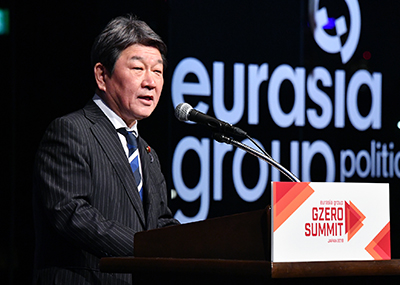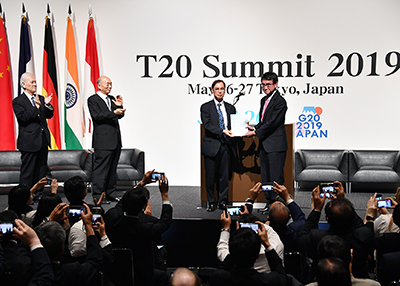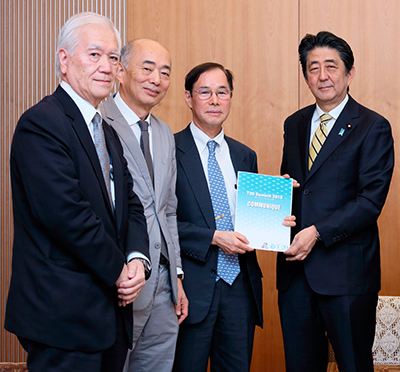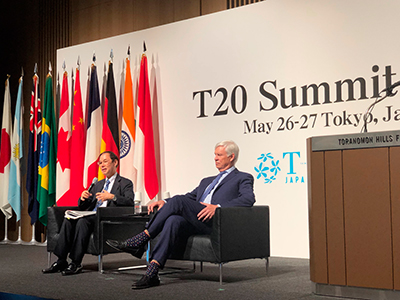Diplomatic Bluebook 2020
Chapter 4
Japan's Diplomacy Open to the Public
3 Role of Intellectuals in Diplomacy
In shaping the future international order in the drastically changing world, it is becoming more apparent that experts from the private sector can take the initiative to freely conduct policy discussions on a global scale without being bound by the official views of governments, which in return have an impact on the world's opinion, as well as on the policy decisions of each government.
 Foreign Minister Motegi gives a speech at an international policy discussion (GZERO Summit) by experts (November 18, Tokyo)
Foreign Minister Motegi gives a speech at an international policy discussion (GZERO Summit) by experts (November 18, Tokyo)Some of the examples include the World Economic Forum (Davos), which has a large influence on the international economic policies of each country, the Shangri-La Dialogue, which provides prominent experts and ministers of the world with an opportunity to discuss Asian security issues, and the Manama Dialogue, which deals with the security in the Middle East. In major countries, there is an ever-increasing importance to develop human resources, such as researchers and think tanks (study and research institutions) to take part in such discussions, and to utilize experts of universities and other organizations.
Expanding the intellectual base for Japan's diplomacy and security, and promoting diplomacy that involves a broad range of people is expected to yield improved diplomatic capabilities over the medium to long-term. Under this premise, MOFA launched a subsidy scheme for study/research on foreign policy and security which aims to enhance think tanks' abilities to collect/analyze/release information and to make policy recommendations. In addition, since FY2017, MOFA has also launched a subsidized support project for territory, sovereignty, and history studies.
In May 2019, the T20 (Think20), which is one of the G20 engagement groups (groups of stakeholders from the international community that are independent of governments) held its summit in Tokyo, and more than 600 people attended, including experts from G20 countries. A communique (policy recommendations) relating to the main issues at the G20 Osaka Summit was submitted to Foreign Minister Kono (see the Column on page 359).
 Submitting Communique to Foreign Minister Kono at the T20 Summit for the G20 (May 27, Tokyo)
Submitting Communique to Foreign Minister Kono at the T20 Summit for the G20 (May 27, Tokyo)Yoshino Naoyuki
Dean of the Asian Development Bank Institute (ADBI) and Chair of T20 Japan
The Think20 (T20) was started at the G20 Summit held in Mexico in 2012. It is a policy research group comprising think tanks around the world, and its aim is to make policy recommendations to the G20 through fact-based evidence and empirical studies.
The T20 Japan 2019, the policy research group for the G20 Osaka Summit, process was led by three research institutes: the Asian Development Bank Institute (ADBI), the Japan Institute of International Affairs (JIIA), and the Institute for International Monetary Affairs (IIMA). It culminated in the T20 Summit in Tokyo on May 26 and 27, 2019, which brought together the best policy experts (more than 600 attendees from 50 countries) from around the world.
 Presentation of T20 policy recommendations to Prime Minister Abe (Author: Center right)
Presentation of T20 policy recommendations to Prime Minister Abe (Author: Center right)In his message to the T20 Summit, Prime Minister Abe, who chaired the G20 Osaka Summit, touched on the importance of the T20 to the G20 process and emphasized the value of T20's policy guidance for a wide range of policy fields, from trade and investment to infrastructural development, climate change and environment, and international finance.
The communique (policy recommendations) issued by T20 Japan stated that “G20 countries have been taking steps closer to this new global goal (to promote a sustainable, inclusive, and resilient society) with recent milestone agreements such as the 2030 Agenda for Sustainable Development (the 2030 Agenda) and the Paris Agreement.” On the other hand, it points out that many global problems still remain to be solved, such as widening inequality, poverty reduction, gender equity, climate change, and how to strengthen resilience to natural disasters. It also adds that we are facing a number of emerging challenges such as the new wave of digital innovation, aging populations, rapid changes in the dynamics of global governance, and the erosion of trust and social cohesion.
The T20's policy recommendations urge G20 countries to address these issues by taking a holistic and systematic approach to cross-cutting issues, and further, through effective and robust global governance architecture, while focusing on investment in human and physical capital.
The policy recommendations presented by 10 taskforces (TF) as the outcome of their policy debates are based on empirical studies and analysis by experts in the respective fields. For example, the taskforce on quality infrastructure investments (TF4) points out that invigorating economic activity in the surrounding areas simultaneously with infrastructural development can contribute to further enhancing the quality of the said infrastructure (“spillover effects”). It raised proposals such as further enhancing the “spillover effects” of infrastructural development in roads and railroads by combining measures to increase employment and enhance education standards in the surrounding areas, with the provision of financing through a “Furusato Investment Fund” to people who wish to establish new businesses, such as restaurants, in the surrounding areas. In addition, it was also proposed to utilize land trusts to facilitate the transfer of rights for the use of land that is required for infrastructural development. The advancement of quality infrastructural development through the application of these ideas is expected to contribute to reducing income disparity and stimulating economic development in each country.
T20 Japan also addressed the problems of aging populations and small and medium-sized enterprise (SME) policy, which Japan and other countries in Asia are especially knowledgeable about.
It was demonstrated that the effectiveness of monetary and fiscal policies would weaken in economies with aging populations, compared to those with a large youth population. In order to maintain sustainable economic growth, there is a need to change to a wage structure based on productivity, rather than seniority, and to extend the retirement age as far as possible to realize a society where people can continue working for a long time. The aging population is a problem confronting countries such as China, the Republic of Korea, and even Thailand, and structural changes in the employment system are necessary beyond traditional monetary and fiscal policies.
With regard to SMEs, as many developing countries have a high percentage of the population employed in SMEs, the T20 recommends SME evaluation using big data, the reduction of non-performing loans by analyzing data on loans to SMEs by financial institutions, and new data analysis methods for SMEs.
 T20 Summit (The author with Professor Robert Engle, Nobel Laureate in economics)
T20 Summit (The author with Professor Robert Engle, Nobel Laureate in economics)Furthermore, at the T20 Summit, Professor Robert Engle, Nobel Laureate and professor at New York University, delivered a keynote speech presenting policy ideas such as inducing environmentally-friendly resource allocation through the stock market. T20 Japan, led by research institutes in Japan, successfully compiled a wide range of recommendations toward eradicating poverty, enhancing education standards, and addressing environmental issues, among others, and communicated these recommendations to the G20 countries. More than 100 individual policy recommendations have been compiled as T20 Japan policy briefs and published fully on the T20 Japan website. I hope you will take time to read through them.


